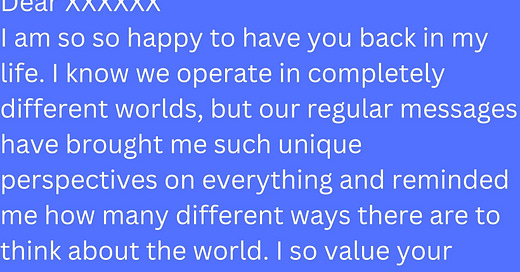A few months ago I received an olive branch, an apology text from someone I’d fallen out of favor with. It was a bit unexpected, and while I felt the message could have been slightly more in-detail as to what said person had done wrong, I did appreciate the effort. I texted back and noted that I hadn’t been perfect in the situation, and I’m pretty sure we’re okay for now.
I’ve given a few authentic apologies in my life, mostly to lovers, colleagues and dear friends. There’s no perfect way to do it, but when you take a step back from your own emotions, the apology is such an interesting art form. Pop culture is rife with references to apologies; just last night I was reading this top 25 apology songs list. Spoiler alert, the number one apology song is from John Lennon which I find hilarious/disturbing given his reputation with domestic violence.
I’ve been toying with this Substack idea for a while, in part because of apologies I haven’t received from a few people in my life. I probably owe a few more people apologies as well.
I know some people who just flippantly issue apologies. I’ve done so just to try to hastily fix things. It’s much harder to truly inspect your own behaviour and recognise your failings. Making things right is hard. I remember taking a girlfriend out to dinner in hopes to apologize for some terrible things I’d done, and by the end of the night we were crying wildly in each others arms. It’s intense shit, the apologizing. You gotta be willing to go deep, and, perhaps most importantly, you must feel genuine remorse. Not only do you have to want to fix things, but you have to legitimately recognize your role in causing the problem.
Why do apologies matter? Are they culturally more important in some places in the world than others? Is it a generational thing as well? Should we have limits as to how many we’ll accept? Jesus famously told his disciple Peter that he should forgive people who have wronged him not seven times but SEVENTY times SEVEN times (why thank you kindly, Baptist upbringing.) The good book tells us that the seventy times seven was actually a little Jesus joke to say, ahem, never stop forgiving people. This is an interesting contrast to the regular messaging I see from pop psych on Instagram for example which often stresses you owe no one your time, you should set boundaries, you should be protective of your energy, etc.
Why does acknowledging that you’ve done something wrong hold such power? Is it ever okay to not have an apology and simply move on? I think occasionally yes, it depends on the extremity. If you’ve slept with my husband, we’ve got a lot more to get through than if you’ve, say, stood me up or unfollowed me on socials. The word “sorry”, can be powerful on its own, but as a writer and lover of drama, I suggest we dress it up a little. Let’s make it fancy, let’s get teary eyed and reflective. By the end of the ideal apology, one person should clearly indicate they are regretful of their error, and both parties involved should be feeling grateful for the relationship and happy to move forward.
I just crafted an apology letter to an old friend whom I have since reconnected with. He hasn’t asked me for an apology, but I feel like we’ve now been on good terms for nearly two years after a decade hiatus, and he wouldn’t mind if I used him as inspiration, especially if he remains anonymous here.
Dear XXXXXX
I am so so happy to have you back in my life. I know we operate in completely different worlds, but our regular messages have brought me such unique perspectives on everything and reminded me how many different ways there are to think about the world. I so value your mind and your honesty at all costs, and you have forced me to reexamine myself and my values. People who make you think deeply and challenge you are a blessing. You have made me reconsider other relationships and recognize how much of my life I could be thinking about more critically. You have made me realize I want to be surrounded by deep thinkers who challenge me.
I remember distinctly, 13 years ago, us having conversations about how good it was to have a friendships like ours. We were very close at one stage. We got off on a rocky start, and I pretended that I was fine with everything that happened between us early on. This is where I owe you an apology. I had a harder time accepting everything that went on between us in the start than I let on, and I am sorry I was not more transparent about that. I know that there’s nothing you could really do about it either way, but I should have been honest with you. Had I told you this, you would have perhaps been less confused by my radio silence for the next ten years. I have a big ego and a lot of pride, and I don’t like ever indicating that anyone can hurt me, especially when they don’t deliberately do so. I am sorry for this. The longer I know you, the more I see you have good intentions and are interested in being a good, moral person. I’m sorry I didn’t tell you about my true feelings. I know you would have appreciated a bit more of an explanation.
Thank you for reading, and here’s to being honest, open deep thinkers together indefinitely.
Alex
Let’s examine the above. I think a good apology not only acknowledges the wrong behavior but also acknowledges why you value the other person as well. Often an apology is the first step in continuing to have a relationship. It’s admitting wrongdoing but also saying ‘I want you to stay in my life.’
Well my hour is wrapping up and we’ve gone everywhere from Jesus to to John Lennon. Please join me another time, when we get into the art of forgiveness, how it’s done, if it’s even possible.
Thank you for reading, please subscribe if you’re bored!




